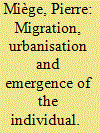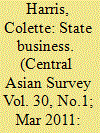| Srl | Item |
| 1 |
ID:
176481


|
|
|
|
|
| Summary/Abstract |
The emergence of the individual is one of the most profound and significant evolutions of Chinese society that has accompanied economic reforms since the late 1970s. Existing research frequently uses a dual concept of ‘individualist’ versus ‘collectivist’ societies to approach the lives of urban Chinese. In the case of same‐sex attracted persons, as they often hide their sexual orientation in most of their social life and must respect social norms of filial piety and marriage, it is easy to conclude that today's urban China continues to be primarily a ‘collectivist’ society where the individual remains fragile. Using a long‐term ethnography of same‐sex attracted migrant men who gather in a public park to create a community of friends and invent some shared cultural and social traits, this paper proposes to deepen the analysis by borrowing the distinction between three different attitudes towards individualism developed by Michel Foucault. It will argue that these men actively construct specific spaces where they can live a private life, as well as experiment and explore their self. Therefore, these men display a more complex articulation between some aspects of a ‘collectivist’ ethos and the strengthening of individual traits.
|
|
|
|
|
|
|
|
|
|
|
|
|
|
|
|
| 2 |
ID:
104063


|
|
|
|
|
| Publication |
2011.
|
| Summary/Abstract |
This article examines the relation of the state to masculinity and sexuality by way of an exploration of the sexual problems of a young man and his wife in Tajikistan at the end of the Soviet era. It suggests that the regime's inattention to this kind of issue was bound up with the importance to the state of projecting appropriate versions of masculinity. It further posits the idea that the continued refusal of the independent Tajik state to offer appropriate treatments for sexual dysfunction is consistent with the image of modernity President Rahmon wishes to present to the world. The article shows that as masculinity discursively occupies the superior gender position, with men expected to dominate, the state is itself impotent to respond when they are, in fact, unable to do so in sexual practice. However, the myth of male dominance persists to the point that it may prevent women from seeing beyond their subordination and finding mutually beneficial solutions in their familial and sexual relationships.
|
|
|
|
|
|
|
|
|
|
|
|
|
|
|
|